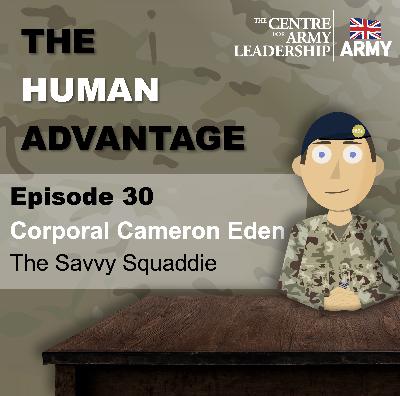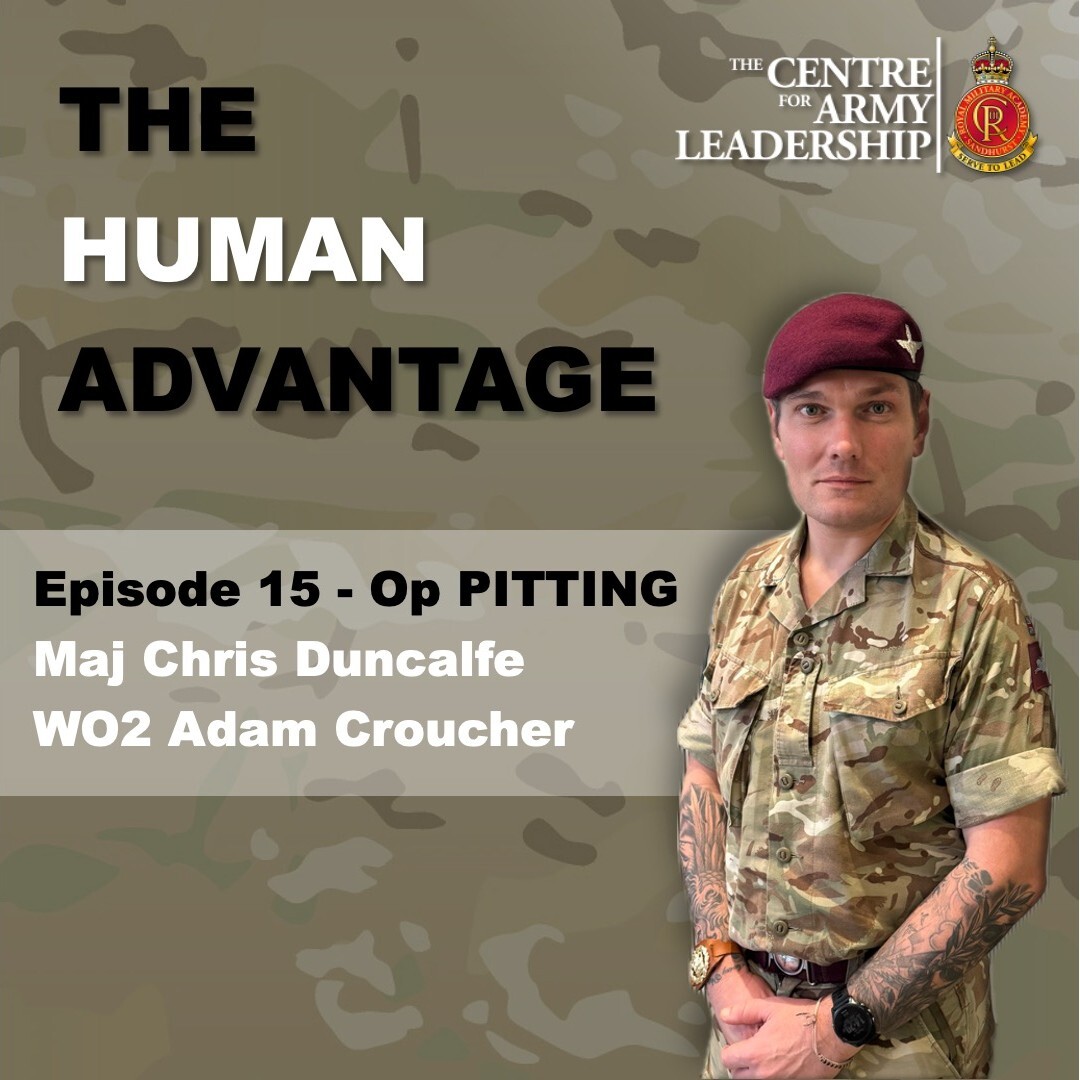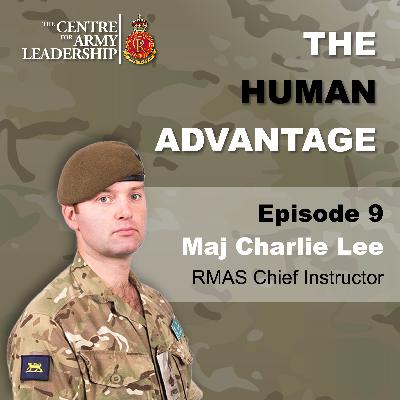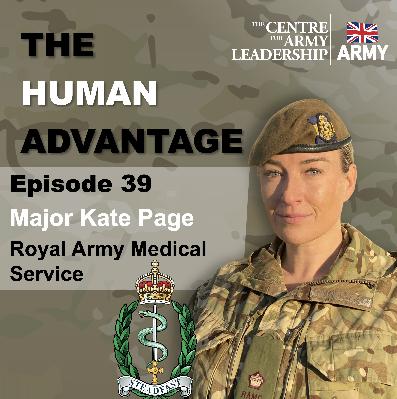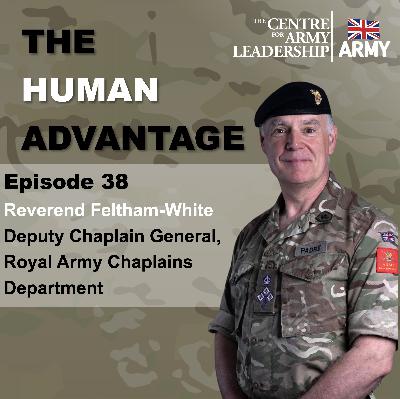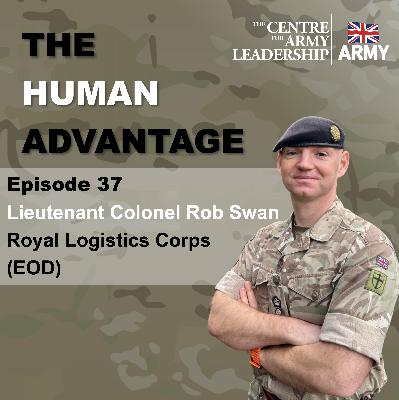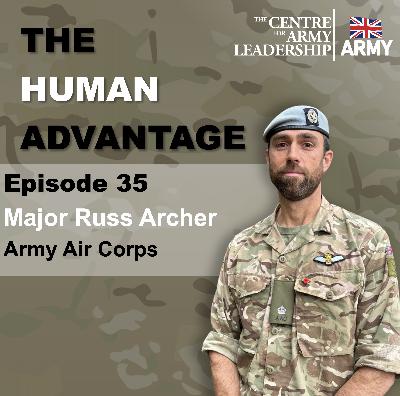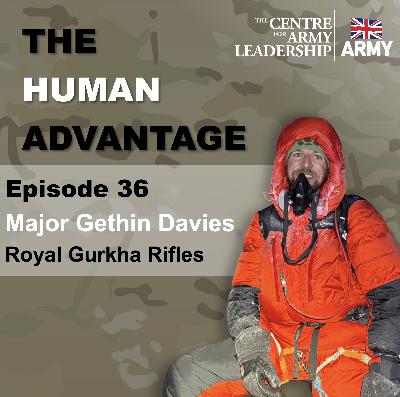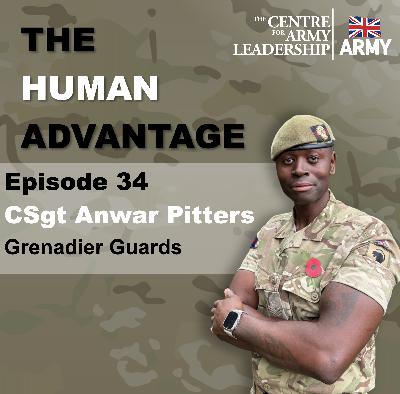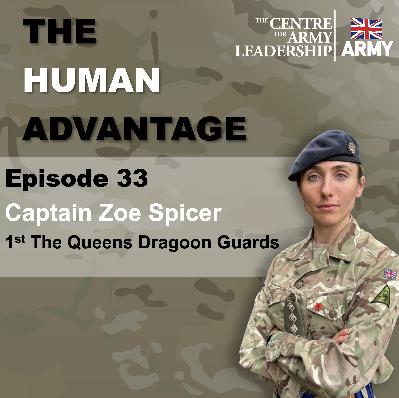Discover The Human Advantage
The Human Advantage

The Human Advantage
Author: The Centre For Army Leadership
Subscribed: 33Played: 328Subscribe
Share
© Copyright 2023 All rights reserved.
Description
The Centre for Army Leadership’s new podcast series. The Human Advantage focuses on the more tactical application of leadership, drawing upon the experience of military leaders on operations and other people-centred challenges at home. Its focus on the importance of leader development will deliver the human advantage that will be vital for success on military operations today and in the future.
38 Episodes
Reverse
In this episode we speak to Lieutenant Colonel Ed Fraser of the Duke of Lancaster's Regiment, formerly the 1st Battalion The King's Regiment, which he commissioned into in 2001. He served in Afghanistan on Op HERRICK, and twice in Iraq on Op TELIC. Away from regimental duty, Lt Col Fraser instructed as a Platoon Commander at the Royal Military Academy Sandhurst, was a Staff Officer in the Army HQ Operational Training and Advisory Group and served as a Military Assistant to the Commanding General US Army Europe. He also led a Mission Support Team for the African Union Mission in Somalia on Op TANGHAM. He attended the Advanced Staff and Command Course at the Defence Academy before his tenure as Commanding Officer of the 4th Battalion The Duke of Lancaster's Regiment, which saw him oversee their contribution to Op INTERFLEX.
We discussed Lt Col Fraser's self-awareness of his leadership style and how it has developed over time, drawing on two particular examples from training prior to Platoon Command. He comments on competency, the ability to do your job from a technical perspective and knowing your your craft entirely, and the necessity of pairing it with human understanding - knowing your people and what makes them 'tick'. Lt Col Fraser recognises the significance of identity and creating a shared purpose, and references to the experience of creating sub-unit identities which aligned with the purpose of training Ukrainian soldiers, on Op INTERFLEX, to facilitate operational effectiveness across the whole team.
A brilliant episode from our archives, full of excellent recommendations for managing your finances around the festive period:
In this episode, our host Captain Ash Bhardwaj speaks to the person behind the The Savvy Squaddie YouTube Channel, Corporal Cameron Eden, who enlisted in the King's Royal Hussars (KRH), before transferring to the Royal Logistic Corps (RLC) to follow his dream of becoming an Army Photographer. With a wealth of experience, deploying to France, Estonia, Afghanistan, Kenya, Finland, America, Canada, and Antarctica, we explore why self-leadership and self-discipline are vital when working autonomously, and how approaching every task with the right mindset and seizing opportunities can lead to remarkable outcomes.
Through his YouTube Channel, the Savvy Squaddie, Cameron has helped thousands of serving and veteran military personnel take control of their personal finances. We also explore the topics of followership and teamwork around a shared purpose, and how knowing your own strengths and weaknesses can aid your self development.
In this episode our host, Ash Bhardwaj, speaks to Colonel Jax Powell. Colonel Powell joined the Army in 1994, commissioning into the Royal Logistic Corps (RLC). She has served on operations in the Balkans, Iraq, Afghanistan and Mali. She has also held several Staff roles including stints at the Permanent Joint Headquarters (PJHQ), Army Headquarters, Home Command, and at the Development Concepts Doctrine Centre. Her junior career included a tenure as a Platoon Commander at the Royal Military Academy Sandhurst (RMAS) and, more recently, she has been an Officer Commanding (OC) of an RLC subunit on Op HERRICK in Afghanistan, and the Commanding Officer (CO) of 25 training regiment. Since joining the General Staff, Col Powell has been Deputy Commandant RMAS and Commander University Officer Training Corps (UOTC). Col Jax will be the next Corps Colonel for the RLC.
In this episode, we discuss ‘being scared of being scared’ on operations, and how being open about fearing fear is not something to be ashamed of. Col Jax also speaks ablut emotional intelligence and how different people have different requirements based on the context of a situation, and how understanding others emotions, as well as your own, in high-pressure situations is crucial to good leadership. She recognises the importance of kindness in leadership, yet balancing this with the necessity to remove emotion and be transactional when applying discipline.
In this episode, we speak to Major David Love, Royal Military Police (RMP), in his role as SO2 Army Leadership at the Centre for Army Leadership (CAL).
We discuss how the CAL are developing the concepts and theory of leadership into tools that the Army can use. He focusses on the importance of understanding your people, and how by taking a human-centred approach to leadership enhances unit and team cohesion, as well as drawing upon the strengths of each individual to achieve greater operational outputs. We also discuss the role of unit identity and the importance of creating the feelings of belonging to forge a cohesive team. Underpinning all of this was understanding the role that empathy plays, firstly by reflecting on examples of where he had been led poorly and being able to evaluate that to shape how he would lead when he was given that responsibility.
In this episode we speak with Lieutenant Colonel Simon Farebrother MC. Simon commissioned in 2001 into the Queen's Dragoon Guards (QDG) - a light cavalry regiment that specialises in reconnoissance. He served on operations on Op BANNER in Northern Ireland, on Op HERRICK in Afghanistan, and on Op TELIC in Iraq. His troop was attached to 3 Commando Brigade during the initial invasion of Iraq in 2003, for which Simon was awarded the Military Cross (MC) for gallantry.
Away from regimental duty, he was a Troop Leader at the Army Training Unit in Winchester. He later taught newly promoted Majors on the Intermediate Command and Staff Course (Land) at Shrivenham, before attending the Advanced Command and Staff Course himself. He later commanded the Army Foundation College at Harrogate throughout the COVID pandemic, and is now Deputy Chief of Staff at the Royal Military Academy Sandhurst (RMAS).
In this episode we learn how the partnership between officers and non-commissioned officers is vital to the Army's performance, and how the organisational culture we create as leaders determines the way people integrate and behave.
In this episode we speak to Major Daljinder Singh Virdee MBE. Major Virdee commissioned into the Royal Army Medical Corps in 2015 as a pharmacist Professionally Qualified Reserve Officer. Following regimental duty with 256 Field Hospital, he re-roled as a Medical Support Officer and went into full-time Reserve service (FTRS). He has since worked in staff roles at Headquarters Regional command, generating forces for deployments and policy and guidance to aid in community engagement and recruiting. Along the way, he developed engagement guides with certain British communities, and codified the dress code for Sikh soldiers.
This episode explores the power of staff work in cultural change and the challenges of teamwork and leadership in the policy environment. We also consider the opportunities for the learning of leadership in the British Army, which is otherwise omitted based on assumption of understanding in some civilian occupations.
In this episode we speak to Doctor and CAL Senior Research Fellow, Lieutenant Tess Morris-Paterson PhD, about what we can learn from her experience in the selection, training, and preparation of astronauts for space flight, and how some of those skills can be applied in a military context to her experience as a Troop commander with 135 Geographic Squadron Royal Engineers.
Lt Morris-Paterson joined the Army Reserve in 2018 and completed trade training as a combat engineer before commissioning as an officer at the Royal Military Academy Sandhurst. In her civilian career, Tess has worked in elite and professional sport for twelve years, working with Olympic and Paralympic athletes, as well as those in the Premier League and Formula1. In 2019 she began working in Human space flight, culminating in a stint at NASA's Ames Research Centre. Tess obtains a PhD in aerospace physiology, and founded her own company, AstroPerform, which specialises in the selection and training of astronauts for space flight. She draws on her experience to highlight the importance of attacking difficult conversations, as soon as possible, and the significance of efficiently providing emotionally intelligent feedback at all levels.
In this episode Captain Ash Bhardwaj speaks to Lieutenant Colonel Liz Kagoda of the Queen Alexandra Royal Army Nursing Corps. Lt Col Kagoda trained and qualified as an emergency nurse in the National Health Service, prior to commissioning in 2005 and has since worked at roles 1-4 across the medical support spectrum. She has delivered everything from immediate life-saving measures in the field, through to long term care at military hospitals back in the UK, as well as deploying twice on Op TELIC in Iraq and three times on Op HERRICK in Afghanistan. Her experience spans from roles such as team leader to officer in charge of the emergency department. She was promoted to Lieutenant Colonel in 2020, and has since focused on governance and assurance for both firm-based and deploying unit personnel. She is currently SO1 Clinical Operations at 2 Medical Brigade, in Yorkshire. This episode outlines how individuals switch between leadership and followership dependent on context, and how leaders require trust and communication to occasionally step back and allow their teams to deliver a task.
In this episode, we speak to Major Chris Duncalfe and WO2 Adam Croucher about their experience during the Non-combatant Evacuation Operation (NEO) of Kabul - Operation PITTING, while in their respective roles of Officer Commanding (OC) and Company Sergeant Major (CSM) of A Company, 2nd Battalion the Parachute Regiment.
Op PITTING marked the end of 20 years of British military involvement in Afghanistan, fighting against the Taliban following the Al Qaeda attacks in the United States in September 2001. We explore how they prepared their Company in the lead up to likely operations, and speak about their insertion into the country and how the operation progressed. We explore the challenges of the operation from a junior leadership perspective, as well as how intent based leadership (or Mission Command) plays a major factor in fostering responsibility, judgement, adaptability and empowerment of others within the team. Finally, we explore the notion of leading by example, particularly when difficult moral decisions must be made, and the utility of responsible challenge and intelligent disobedience in the face of a dynamic and rapidly changing operational situation.
In this episode, our host Captain Ash Bhardwaj speaks to Sergeant Dorian John about the importance of empathy and rapport in getting things done. Sergeant Dorian John was born in the Commonwealth of Dominica and enlisted into the Royal Signals in 2003 and served on OP TELIC 5 in Iraq and OP HERRICK 6 in Afghanistan as a Lance Corporal Dorian transferred to the Adjutant General Corps, Staff and Personnel Support Branch (AGC SPS). He was attached to 5 Rifles and served on OP HERRICK 15 as a linguist with one of the seven languages he speaks. As a Sergeant, Dorian served in the Joint Casualty and Compassionate Centre in Headquarters British Forces Germany before moving to NATO's Allied Rapid Reaction Corps' support battalion. He's now at Headquarters Allied Rapid Reaction Corps (ARC) and has been recently selected for promotion to Staff Sergeant.
In this episode, our host Captain Ash Bhardwaj speaks to WO1 David Hird, the Command Sergeant Major of the Land Warfare Centre (LWC). He enlisted into the Royal Engineers in 1997, joining 35 Engineer Regiment before moving on to Engineer Search Teams, completing his trade training at 1 Royal School of Military Engineering Regiment in Chatham, and passing All Arms Parachute selection. He has served on Op BANNER in Northern Ireland, Op HERRICK 5 and 11 in Afghanistan, Op TELLICK 9 in Iraq, as well as Op OLYMPIC and exercises all over the world. He instructed at 3 Royal School of Military Engineering Regiment at Minley as a Section Commander, and as a Quartermaster Sergeant Instructor in Combat Engineering Recognisance. He was Squadron Sergeant Major of 17 Field Squadron Explosive Ordinance Disposal and Search (EOD), and Regimental Sergeant Major at 23 Parachute Engineer Regiment. He assumed the role of Command Sergeant Major at the Land Warfare Centre (LWC) in Warminster in April 2021. In this conversation, WO1 David Hird reflects on how his leadership style has needed to evolve in order to keep pace with the changing requirements of a more professional Army, and how good Mentorship helped him build more productive relationships with those in positions of command.
In this episode, our host Captain Ash Bhardwaj speaks to WO2 Colin Russell who enlisted into the Royal Scots Dragon Guards (SCOTS DG) and trained on the British Army's Main Battle Tank the Challenger 2. He served on 2 tours of OP TELLICK In Iraq before moving to the Queen's Royal Hussars (QRH) as a corporal. AS a Sergeant he commanded a QRH multiple in the light infantry role in Afghanistan on OP HERRICK 15. He has been a sergeant instructor at the Heavy Armour Wing, a Squadron Quartermaster Sergeant and was a lethality survivability subject matter expert on the development of the British Army's new armoured vehicle, Ajax. In this conversation, WO2 Colin Russell reflects on the power and proffesional competence of leadership, acknowledging your mistakes and some unexpected benefits of the discipline procedures.
In this episode, our host Captain Ash Bhardwaj speaks to Major Charlie Lee, who was commissioned into the Princess of Wales Royal Regiment (PWRR) in 2006. After Rifle Platoon Command, he deployed on HERRICK 15 in Afghanistan in 2011 as part of the Police Advisory Team. He returned to Battalion as Officer Commanding of the Mortar Platoon, then Battalion Operations Officer. After Staff College and various Staff Officer roles, he took on Sub Unit command of the Second Battalion PWRR, operating in the Specialised Infantry role with operational tours in East Africa. He is currently the Chief Instructor for the Senior Term at the Royal Military Academy Sandhurst. In this conversation, Major Lee reveals how his early mistakes made him explore the balance between being liked and respected and the application of loyalty and integrity to others and the chain of command.
Trigger warning: this episode contains discussions of death, suicide, cancer, and trauma, including adverse childhood experiences.
In this episode, we’re honoured to welcome Major Kate Page, an Army GP whose leadership journey has spanned operational deployments, trauma medicine, and long-term illness.
With years of experience as a Regimental Medical Officer (RMO) to artillery, infantry and EOD regiments, Kate brings rare insight into the emotional intelligence and empathy required to lead people in crisis, both physical and psychological.
From Iraq to South Sudan and everywhere in between, Kate has provided care in some of the most complex environments. She reflects on the unique role of the military doctor, not just treating illness and injury, but shaping culture, advising the chain of command, and transforming lives through trust and discretion. Her work demonstrates how medical leadership can create loyalty, cohesion, and mission readiness.
Kate also opens up about her personal journey with incurable metastatic breast cancer. From the patient’s chair as well as the doctor’s office, she explores the tension between the needs of the individual and the needs of the service, and what leaders can do to strike the balance. She offers a deeply human perspective on recovery, resilience, and the power of purpose.
This conversation is a masterclass in leading with empathy, navigating confidentiality, and fostering psychological safety. As Kate reminds us, “People will always remember how you treat them when they’re at their most vulnerable.” And that, more than anything, can define the strength of a team.
In this episode, our host Ash Bhardwaj speaks with Reverend Anthony Feltham-White OBE, the Deputy Chaplain General of the British Army. We delve into the concept of leadership through the lens of a chaplain, exploring the unique perspective that Revd Feltham-White brings, shaped by years of experience in both military operations and spiritual care. His journey in leadership began when he joined the Royal Army Chaplains’ Department in 2005, after being appointed to the Church of England diocese of Oxford in 2000.
Revd Feltham-White has served in multiple operational environments, including Iraq and Afghanistan, and has spent significant time at the forefront of leadership development within the military. Drawing on his diverse experience, he highlights the importance of self-knowledge as the cornerstone of leadership. He emphasises how understanding one’s own character is vital to fostering psychological safety within an organisation, where individuals can perform at their best without fear of judgement.
As a chaplain, Revd Feltham-White's leadership focus is not just on spiritual care, but also on providing moral and ethical guidance to both junior soldiers and senior commanders. Through his work, he ensures that leaders at all levels understand their role in supporting and recognising the individual within their team. He notes that leadership isn't just about decisions and direction but about creating a safe and supportive environment for growth, especially when facing the pressures of military operations.
In this episode, Revd Feltham-White shares his experiences working with commanders, and how his role as a chaplain enables him to speak truth to power in a way that others may not be able to. From challenging difficult decisions to supporting individuals through personal crises, his leadership approach is rooted in empathy, emotional intelligence, and a deep understanding of people.
Join us as we explore the importance of self-awareness, the role of chaplains in supporting both the spiritual and emotional well-being of soldiers, and the value of character-driven leadership in high-pressure environments.
In this episode, our host Ash Bhardwaj speaks with Lt Col Rob Swan, a leader with a diverse career in the British Army. We explore the intersection of leadership, technical expertise, and the development of teams through Rob's unique perspective.
Col Swan's journey began when he commissioned into the Royal Logistics Corps (RLC) in 2004. His first experience in leadership came when he served as a transport troop commander during Operation TELIC 6 in Iraq, where he led combat logistics patrols. This was a defining period that set him on a path towards becoming an Ammunition Technical Officer (ATO) and, eventually, an Explosive Ordnance Disposal (EOD) operator. His leadership experience in EOD is particularly notable, where he balanced technical proficiency with the command of highly specialised, intelligent, and experienced teams.
Throughout the episode, He discusses the challenges of earning credibility when transitioning into leadership roles, particularly when managing teams of individuals with more experience in their technical trades. He shares how trust, both in his team's expertise and his own leadership, was crucial to his success. He also highlights the importance of building a culture where psychological safety is paramount, ensuring that team members feel safe to challenge their leader when necessary, especially in high stakes environments like EOD operations.
This episode provides a deep dive into leadership from the unique perspective of an officer who has navigated both the technical and command challenges within the Army. His insights on developing trust, the value of continual professional development, and adapting leadership styles based on individual team members’ needs offer valuable lessons for all leaders.
Join us as we explore how leadership is about more than just knowledge: it’s about experience, trust, and building strong, capable teams through the right balance of challenge, support, and understanding.
In this episode, our host Ash Bhardwaj speaks with Major Russ Archer of the Army Air Corps. With a wealth of experience in leadership and command, Russ shares his perspective on what it truly means to lead in complex environments.
Russ discusses the challenges of preparing soldiers for the realities of modern warfare, highlighting the balance between discipline, adaptability, and trust. He reflects on the importance of developing leaders who can think independently, make sound decisions under pressure, and empower their teams to operate effectively. Drawing from his own experiences, he emphasises that leadership isn’t about having all the answers but about creating the conditions for others to succeed.
He also explores the evolving nature of leadership, particularly in the context of Mission Command. Russ explains how leaders must build strong, cohesive teams that can take initiative, make sense of ambiguity, and operate with confidence when guidance is limited.
Join us as we unpack the key principles of leadership with Major Russ Archer - covering trust, autonomy, and the vital role of junior leaders in shaping operational success.
In this episode, We explore why transformational leadership lays the foundation for effective transactional leadership in high-stakes situations. Our host Ash Bhardwaj chats to Major Gethin Davies, an experienced officer in the Royal Gurkha Rifles and accomplished mountaineer, who shares insights from his leadership journey, including his role leading the British Army’s 2024 Everest expedition.
Drawing from his military background and extensive mountaineering experience- including summiting Everest twice - Gethin emphasises the importance of transparent communication, building trust, and meticulous planning. He discusses how transformational leadership fosters team cohesion, enabling difficult decisions to be accepted and understood in critical moments.
He recounts the rigorous preparation for the Everest expedition, including war-gaming potential scenarios and cultivating team trust to openly share perceived weaknesses. He highlights the similarities between military operations and high-altitude mountaineering, emphasising the necessity of self-sufficiency, decision-making under pressure, and physical endurance.
This episode provides powerful lessons on leadership, military adventurous training, decision-making, and team dynamics in extreme environments.
In this episode, our host Ash Bhardwaj speaks with CSgt Anwar Pitters, an experienced British Army leader whose career has been defined by his dedication to developing soldiers and maintaining the highest standards of leadership. With a wealth of operational experience and a passion for mentorship, Anwar shares his journey from the early days of soldiering to becoming a respected senior leader.
Anwar discusses the realities of leading teams in high-pressure environments, reflecting on the moments that tested his resilience and shaped his leadership philosophy. He delves into the significance of trust, discipline, and the small but powerful actions that define effective leadership. Drawing on his time mentoring junior soldiers and officers alike, he highlights how leadership isn’t just about authority, it’s about setting the tone, investing in people, and creating a culture where individuals thrive.
Throughout the conversation, Anwar emphasises how leadership often happens "in the margins" - in the conversations after a tough day, in the quiet guidance given to a struggling soldier, and in the consistency of leading by example. He speaks candidly about the lessons he’s learned, the mentors who influenced him, and the responsibility of shaping the next generation of Army leaders.
Join us as we explore how true leadership goes beyond decision-making, it's about understanding your team, embracing challenges, and leading with purpose.
In this episode, our host Ash Bhardwaj speaks with Captain Zoe Spicer of the 1st The Queens Dragoon Guards, an inspiring leader with a wealth of experience in leadership, development, and mentorship across her military career. Notably, Zoe made history as the first Woman to commission into the QDG, and acts as the Royal Armoured Corps Servicewomen's Representative, championing the voices of women across the Corps.
Capt Spicer shares her journey through the Army, reflecting on pivotal moments that have shaped her leadership philosophy. From leading teams in the challenging operational environment of Op NEWCOMBE in Mali to mentoring junior soldiers and officers, her experiences highlight the multifaceted nature of military leadership.
She emphasises the importance of fostering trust within teams, empowering individuals to take ownership of their roles, and embracing adaptability in the face of uncertainty. For her, leadership is about creating an environment where individuals can thrive and work towards collective success.
This episode provides a deep dive into the practical application of leadership principles, seen through the lens of her impressive career. Her insights into decision-making, resilience, and team cohesion offer valuable lessons for leaders in all walks of life.
Join us as we explore how leadership is about more than just rank and responsibility—it's about breaking barriers, nurturing potential, and leading with authenticity.



